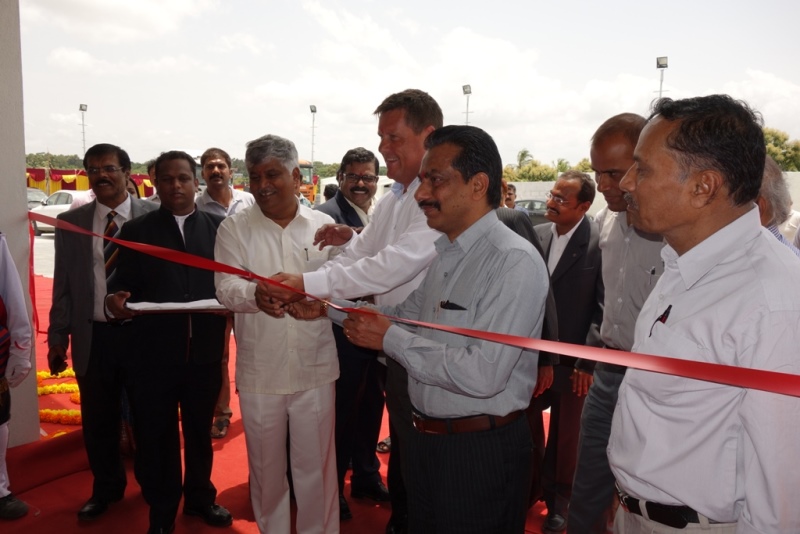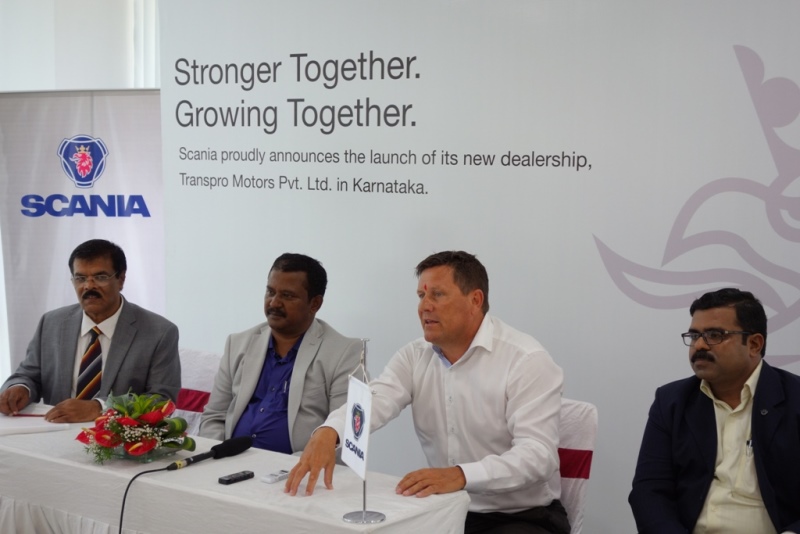Well-equipped Bidadi showroom opened
Precisely 22 months after formalizing its first industrial facility at Narsapura in Kolar district of Karnataka in October 2013, Scania has opened its first dealership in Karnataka covering 100-odd km, diametrically opposite to it at Bidadi in Ramanagara district. With a total of nine dealerships in the country, Scania plans to take the number up to 50 and double the capacity by 2020. MOTORINDIA was there to witness the inauguration of the new showroom.
Roughly an hour’s drive away from Bengaluru, in Bidadi, Ramanagara district is situated the first showroom of Scania, Transpro Motors. The sunny morning shows off the glass façade of the service showroom with its wide parking lot, and a huge workshop floor. Transpro Motors is now the official host to the Swedish truck and bus brand’s customers in Karnataka.
A veteran in the world market, Scania is barely three years old in India since its manufacturing facility at Narsapura in Kolar district of Karnataka came up in October 2013. Mr. Anders Grundstromer, Managing Director, Scania India, and Senior Vice President, Scania Group, says: “A good product without a good service back-up will not work. So we need to grow our service network.”
Mr. M.K. Lakshminarayan, Chairman, Transpro Motors, who invested Rs. 10 crores in the service showroom, says: “We should be earning Rs. 12 crores this financial year by servicing the buses and trucks alone because we hope to meet the growing demand for these products.”
Considering that Karnataka will now see more than Scania’s buses like their haulage tractors and trucks, it sure sounds like a promise.
Speaking on the logic behind opening Scania’s first dealership in Karnataka in the East while its manufacturing facility is in the West, Mr. Grundstromer explains: “We shall cover a big area because we are in the East, Transpro in the West, Hyderabad road connecting with Mumbai highway in the North and then Coimbatore and Salem in the South. With our buses and on-road trucks out soon, the dealers will be able to sell, service and repair our products and offer spare parts.”
Mr. Sivakumar.V, Director, Sales, Scania Commercial Vehicles India, shares: “Presenting a dealer who will be catering to the inter-city hub operating from Bengaluru gives us an advantage where the customer has the access to service round the clock.” With its 15 service vans, Scania, through Transpro Motors, wishes to help its customers in a couple of hours.
Branching out
The Rs. 600-crore company, Scania now has nine dealerships in Tamil Nadu, Karnataka where soon it will spread to Hubli and Mangalore, Kerala, Andhra Pradesh, Telangana, Maharashtra, Gujarat, Rajasthan and Delhi NCR. Scania also has roughly 25 service workshops, including those in northern and southern collieries. It is planning to set up new ones in limestone and iron ore mines as well.
Since commencement of operation at its first bus manufacturing plant at Narsapura in March 2015, Scania has delivered 100-odd buses to customers, including 26 to SRS Travels and 30 to KSRTC, besides delivering to Parveen Travels and KPN Travels, among others.
Scania has made an entry into Uttar Pradesh by delivering four buses to UPSRTC. Two buses have been supplied to APSRTC for trial run. It has won an MSRTC order and hopes to deliver 38 buses in a month or so. Mr. Sivakumar says: “Out of the Indian production since March this year, 20 buses have been delivered. Previously they were coming from Malaysia. This month we are delivering one bus per day, and our aim is to deliver 200 buses a year.”
Scania has always emphasized sustainable solutions in transportation by making the vehicles and roads safer using its innovative techniques. Mr. Grundstromer adds: “You can say in India you have the safest bus in the world with us because one of the many things we do is we fulfill 66 roll-over tests.”
Mr. Sivakumar continues: “We are getting one step closer to the end customer, the passenger. We are in the process of delivering buses to KSRTC, and they will start operating on many routes, including the Mysore corridor.” Scania has an order for delivery of 35 buses to KSRTC, of which 10 have been supplied.
Green bus
Scania’s first eco-friendly bus was handed over to the Nagpur Municipal Corporation for a trial run in August 2014. Mr. Grundstromer is hopeful of introducing bio-ethanol or bio-gas bus and metro-link bus in Bengaluru. According to him, the fuel Ethanol ‘ED95’ reduces CO2 emissions, smoke and residual particulate matter by 90 per cent. “Using bio-ethanol we touch Bharat Stage 5, and with bio-gas as the fuel we go up to Bharat Stage 6 overnight.” With the approval of the regulatory authorities, the company is now hoping to produce and operate 50 of these green buses by the end of 2015.
While Scania is pushing ahead with its organic buses, other automotive giants are working on electric and hybrid buses. Mr. Grundstromer says: “Does electrification make sense when you produce 80 per cent of it from fossil fuels like coal? You just move the problem somewhere else. Besides, the cost of an electrified vehicle is three times that of a bio-fuel bus. We are of the opinion that the Government should support the bio-fuel chassis the same way it has the electrical chassis because bio-fuel chassis are cleaner and more efficient for India.”
Scania launched its green bus technology and compatible engine in Europe an year-and-a-half ago. It hopes to use the same engine in India too.
Nurturing drivers
Paying attention to the one significant link in the transport sector – the driver – Mr. Grundstromer shares that two to three drivers per vehicle delivered are trained. “Operations in Indian cities today can improve by training, but we also need to give them a decent salary. Then the drivers will behave better on the roads. Also, when we take the data from the computers in each bus, we know the way the vehicle and the driver behave. We can help the driver behave differently, so that his scoring is better, the journey is safer, and less fuel is used.”
Hence, Scania’s new depot at the Nagpur facility will have driver rooms, rest rooms and training rooms, besides state-of-the-art bio-ethanol and bio-gas filling stations.
With a current production capacity of 2,500 trucks and 1,000 buses, the company aims to double it by 2020 with a target of selling 5,000 trucks and 2,500 buses annually. In the premium truck segment, it is ahead of its target of 35 per cent market share by touching 44 per cent, and has roughly 1,500 units, including on and off-road trucks, city buses and inter-city coaches plying on Indian roads.
Today Scania is more than its mining trucks with which it had entered the Indian market. Expansion into segments like cargo transportation – dry, frozen or wet, or cement mixers, off-roads, on and off-road ODC pullers, besides buses – has been only natural for it. Come October, Scania plans to launch its new on-road truck range with bigger capacities and tailor-made products for Indian haulage.

